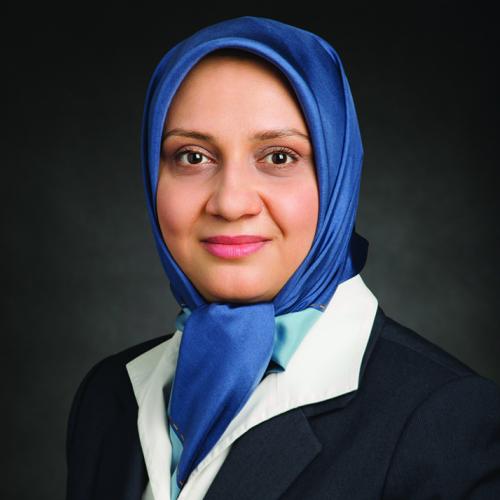Zahra Mohaghegh, GSLIS-affiliated faculty member and assistant professor in the Department of Nuclear, Plasma and Radiological Engineering (NPRE), has been honored with the 2015 Dean’s Award for Excellence in Research from the College of Engineering at Illinois.
An NPRE faculty member the past two years, Mohaghegh has pioneered research in systematic causal modeling of the interactions of physical and social failure mechanisms and in incorporating Big Data Analytics into Probabilistic Risk Assessment (PRA). PRA is one of the key pillars of the Risk-Informed regulatory framework for the Nuclear Regulatory Commission (NRC). In addition to NRC, a growing number of government agencies in the U.S., including the Department of Energy (DOE), the Federal Aviation Administration (FAA), the National Aeronautics and Space Administration (NASA), the Department of Defense (DOD), the Environmental Protection Agency (EPA), and the Food and Drug Administration (FDA), have begun to utilize PRA for policy setting and decision-making.
Catastrophic events such as Fukushima and Katrina have made it clear that the capability of integrating physical and social causes of failure into a cohesive modeling framework is the future of risk analysis. Because accident scenarios must consider social and environmental distress, managerial deficiency, and human error in addition to physical and technical system failure, risk analysis requires the development of a common vocabulary within diverse engineering and social science domains in order to address risk emerging from the interface of social and technical systems.
Mohaghegh’s work in this area has received considerable recognition. In 2013, she won the George Apostolakis Fellowship Early-Career Award in Risk Assessment. Apostolakis, an emeritus professor of the Massachusetts Institute of Technology (MIT) and a former NRC commissioner, has been one of the pioneers in risk-informed approaches, and he now leads the international team assessing the restart of nuclear reactors in Japan. From an applications perspective, Mohaghegh has been involved in a large-scale industry project sponsored by the South Texas Project Nuclear Operating Company, contributing to the development of an integrated risk methodology for the resolution of the nuclear industry’s twenty-year Generic Safety Issues 191 (GSI-191) challenge.
As an advisor of multidisciplinary graduate students, Mohaghegh is an affiliate of Industrial and Enterprise Systems Engineering (ISE), Beckman Institute for Advanced Science and Technology, GSLIS, and Institute of Informatics, in addition to her appointment in NPRE.
Mohaghegh sees the 2015 Dean’s award as the result of strong teamwork and state-of-the-art research emanating from the Socio-Technical Risk Analysis (SoTeRiA) Laboratory, her research group at Illinois. The SoTeRiA Laboratory has been creating a transdisciplinary platform to further risk analysis technology that will contribute to a safer and more sustainable world. Established in January 2013, the dedicated work of the SoTeRiA Laboratory team has resulted in successfully advancing the use of risk analysis for the improvement of performance and safety in high consequence industries, thus protecting workers, the public, and the environment. The SoTeRiA research group’s accomplishments have been in four main areas:
- Scientific Contributions to Risk Analysis: The research team has contributed to the development of academic foundations for risk analysis by incorporating state-of-the art Big Data Analytics into risk models, simulating the underlying physical and social failure phenomena into systematic risk scenarios, and publishing and presenting more than 25 papers at national and international risk analysis conferences. Examples of the team’s current research projects include: modeling fire risk in NPPs; location-specific Loss of Coolant Accidents leading to Emergency Core Cooling System failure; modeling the effects of human and organizational factors on NPPs’ technical system failure; socio-technical risk-informed emergency preparedness, planning, and response modeling for severe accidents; and evaluating the monetary value of PRA.
- Expansion of Risk-Informed Solutions for the U.S. Nuclear Industry: Risk-Informed solutions to regulatory initiatives can be used to analytically support cost avoidance measures that are based on a level of risk reduction and, therefore, result in significant savings to the utilities. These solutions require a strong academic foundation in order to achieve accurate results and receive regulatory approval. The SoTeRiA Laboratory has been involved in a new and challenging risk-informed project for the nuclear industry and by maintaining a close relationship with this industry, the group can provide aid to nuclear power utilities, allowing them to react quickly to challenging risk-informed research needs.
- Promoting International Safety Through Risk-Informed Solutions: The U.S. has been a leader in nuclear safety risk analysis methods. However, when applying risk in diverse industries (e.g., nuclear, oil and gas, aviation, chemical processing, etc.) and in other countries (e.g., China, Japan, etc.), the geography, culture, and operating experiences of each must be explicitly considered in order to avoid the potentially misleading results of a blind carbon copy of risk analysis techniques and regulations. The SoTeRiA Laboratory has initiated collaborations among multiple departments at UIUC and with national and international research institutions in order to achieve tailor-made solutions for high-risk operations around the world. In March 2015, the SoTeRiA Laboratory developed and presented the U.S.-China Probabilistic Safety Assessment Workshop on ‘Risk-Informed Regulation and Safety Culture’ in Shenzhen, China, as part of the DOE’s Peaceful Uses of Nuclear Technology (PUNT) program.
- Providing Educational Services: Mohaghegh and her research team are establishing foundational risk analysis research and education at the University of Illinois Urbana-Champaign. Real-world risk analysis opportunities have been made available to student researchers to interface with industry, participate in diverse research teams, and contribute to the engineering and social sciences. Mohaghegh and her research team organized the Risk Management Topical Meeting at the Winter 2013 Meeting of the American Nuclear Society (ANS). The meeting had significant success in assembling a wide range of leaders in the field of risk analysis.
Together, the SoTeRiA Laboratory team is helping usher in a new era, void of catastrophic technological accidents, where industry-academia projects are leveraged to raise social responsibility for the protection of workers, the public, and the environment.
